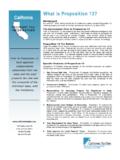Transcription of new study findings why fostering a growth mindset in ...
1 Culture-shaping firm Senn Delaney, a Heidrick & Struggles company, is pleased to share findings from a two-year study of several Fortune 1000 companies to examine the impact of an entire organization s partnership with Senn Delaney, the research was completed by Stanford Psychology Professor Carol Dweck and her colleagues, Mary Murphy, Jennifer Chatman and Laura latest research adds a new dimension to Senn Delaney s understanding of the correlation between a growth mindset culture of development and positive behaviors in organizations. findings point to the importance of cultivating a growth mindset culture of development as key factor in creating greater agility and innovation and developing an engaged, collaborative, highly committed and trusting study findingswhy fostering a growth mindset in organizations matters Senn Delaney-Stanford organizational mindset study findings [2]BackgroundSenn Delaney has been conducting five years of ongoing, collaborative research with professors at Stanford University, University of Southern California, University of California, Berkeley and the University of Michigan Ross School of Business.
2 What s new Our goal was a deeper inquiry into understanding this question: Can organizations as a whole show these growth mindset characteristics? A two-year study of several Fortune 1000 companies examined the implications of an entire organization s root of this new study is about how a growth mindset , which the research team calls a culture of development versus a fixed mindset , which it calls a culture of genius affects such cultural charac-teristics in organizations as collaboration, innovation, creativity, risk taking and eth-ical have either a fixed or a growth mindsetAn organization s mindset is the belief that it and its workforce have about the nature of talent and ability. Our new research has found that some compa-nies foster a fixed mindset culture of genius, in which talent is worshipped.
3 This type of organizational culture asserts that employees either have it or they don t, when it comes to skills and learn-ing organizations, however, foster a growth mindset culture of develop-ment. This type of organizational culture asserts that people can grow and improve with effort, good strategies, and good Does your organization have a growth mindset culture of development or a fixed mindset culture of genius? mentoring. Culture-of-development orga-nizations foster growth mindset , actively seeking to stretch their employees and promote new skills. Do these different organizational mind-sets make a difference? If so, then how?The research team also wanted to see how an organization s mindset influenced employees, as well as supervisors evalua-tions of their study To define what kind of culture each com-pany had, we asked a diverse sample of employees at each organization which culture they thought their company had a culture of genius or a culture of development.
4 The responses at each com-pany were aggregated to see what the consensus was. Then, instead of focusing on how peo-ple s personal beliefs about themselves affected their own outcomes, as previous research has done, this new research explored how the company-wide beliefs influenced workers satisfaction, as well as their perception of the organization s culture: the level of collaboration, inno-vation and ethical behavior that was embraced in each company. This ongoing study is the first empirical study of how organizational mindsets influence employees and supervisors (and it was conducted in known Fortune 1000 companies). It will be of interest to CEOs and organizational leaders seeking to better understand their organizational mindset , and whether it is serving them or may need to findingsHere s what our research found.
5 Greater trustPeople in growth mindset culture of development companies have more trust in their company and a greater sense of ownership over their work. In fact, they expressed 47% higher agreement with statements about commitment to companyIn line with this, employees in cul-ture-of-development companies reported that they were more committed to their company and more willing to go the extra mile for it. They are 34% likelier to feel a sense of ownership and commitment to the future of the company. Indeed, those who worked in culture-of-genius com-panies said they were more interested in leaving their company for support for risk-takingIt s nice that employees in culture-of-development organizations feel trusting and committed, but what about agility and innovation?
6 That s something that organizations should and do care greatly about these days. Perhaps a company has to sacrifice some comfort and loyalty to be on the leading edge. Perhaps a belief in genius motivates innovation. But we learned that it doesn is the employees in culture-of-develop-ment companies the companies that believe in people s growth who are more likely to say that their organization supports (measured) risk taking, inno-vation, and creativity. For example, they agreed more strongly with statements like: This company genuinely supports risk-taking and will support me even if I fail, or When people make mistakes, this company sees the learning that results as value added. or People are encouraged to be innovative in this com-Senn Delaney-Stanford organizational mindset study findings [3]pany creativity is welcomed.
7 Those in culture-of-development compa-nies showed 65% stronger agreement that their companies support risk-taking and 49% stronger agreement that their organizations foster innovation than those in the culture-of-genius in the culture-of-genius com-panies not only say that their companies are less likely to support them in risk-tak-ing and innovation, they also say that their organizations have more unethical behaviors: In this company there is a lot of cheating, taking shortcuts, and cutting corners. or, In this company people often hide information and keep secrets. According to Dweck, this means that when organizations place a high premium on natural talent, everyone wants to be the superstar ansd may be more likely to cheat or cut corners to do reverse was true in how people in culture-of-development companies view company ethics.
8 In fact, 41% more strongly disagreed that their organizations were rife with unethical behavior. More positive view of employees by supervisorsSo, employees in culture-of-development companies had more positive views of their organizations. Is that admiration reciprocated? Yes, supervisors in these companies had significantly more positive views of their employees and on the dimensions companies should care about. Supervisors in the culture-of-development companies rated their employees as more innovative, collaborative and committed to learning and also viewed their companies as having far greater management poten-tial all things that make a company more agile and more likely to stay in the people say When asked to talk about their com-panies, people within the organizations involved in the study spoke spontaneously and passionately on a few themes around accountability and in a health care organization with a more culture of genius talked about the lack of initiative and the entrenched resistance to change at a time when the industry requires transformational change to survive.
9 The common responses of peo-ple in their company? It s not my job. It s somebody else s responsibility. By contrast, people in the study who work in another health care organization that has made the cultural shift toward a growth mindset culture of development, had more positive one manager, describing the change, ..the focus began to shift towards improvements (innovative ways).. and less blame on why others were impeding their the past, the solutions were vague and blaming, now they are focused and specific. This manager goes on to talk about initiat-ing daily huddles with his group about the pressing issues of the day. They have responded, he says, by taking greater ownership of the bigger picture and being more innovative in their way of think-ing.
10 He adds, I ve seen my department findings support creating a growth mindset culture of development Trust: Employees in growth mindset culture of development companies expressed a 47% higher agreement with statements about having more trust in their company Engagement: Employees in growth mindset culture of development companies are 34% likelier to feel a sense of ownership and commitment to the future of the company. Innovation: Those in growth mindset companies showed 65% stronger agreement that their companies support risk-taking and 49% stronger agreement that their organizations foster innovation. Ethics: Those in growth mindset culture of development companies disagreed 41% more strongly than those in fixed mindset companies that their organizations were rife with unethical behavior.




